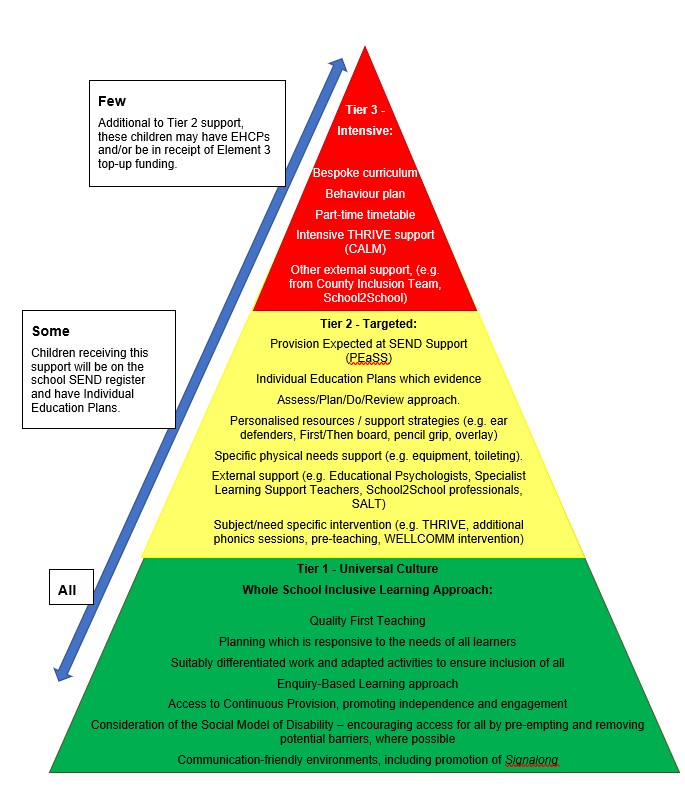SEND Information Report and SEND Policy
SEND Policy and Information Report 2023 - 2024
|
||||||||||||||||||
SEND at Lakenham
Welcome to our SEND information report which is part of the Norfolk Local Offer for learners with Special Educational Needs and/or Disabilities (SEND). All governing bodies of maintained schools have a legal duty to publish information on their website about the implementation of the governing body’s or the proprietor’s policy for pupils with SEND.
This information is updated annually. At Lakenham Primary School we value all members of our school community. Our inclusive local offer has been produced with pupils, parents and carers, governors and members of staff.
Contents
- Aims and Vision...................................... 2
- Legislation and Guidance........................ 3
- Definitions............................................... 3
- Roles and Responsibilities...................... 4
- SEND Information Report........................ 6
- Diagram showing SEND support as a tiered approach……………………………9
- Further information and support services (key links)………………………..……14
- Monitoring Arrangements...................... 14
- Links with other Policies and Documents 14
…………………………………………………………………………………………………………………………….
1. Aims and Vision
Our SEND policy and information report aims to:
- Set out how our school will support and make provision for pupils with Special Educational Needs and/or Disabilities (SEND).
- Explain the roles and responsibilities of key people involved in providing for pupils with SEND.
Our vision is to ensure:
- That all children can access the curriculum and are fully able to enjoy, aspire and achieve.
- There are effective management systems and procedures for SEND, taking into account the current Code of Practice (2015).
- There is effective communication between those involved in the teaching and supporting of children with SEND, including teachers, parents/carers, outside agencies and the children themselves.
- That parents/carers of children with SEND feel their views and opinions are valid and listened to.
- Most children with SEND at Lakenham have Individual Education Plans (IEPs) including, SMART targets, suitably pitched at their level. These evidence the school’s embedding of an ‘Assess, Plan, Do, Review’ approach, as outlined in the SEND Code of Practice.
- Some children with SEND may not have IEPs. Reasons for this may include them being new to the school and/or arriving mid-IEP cycle. Similarly, children newly raised as SEND may be still at the ‘assess’ stage, with class teacher, SENDCo and/or external agencies still investigating the child’s needs and how best these could be supported.
- Further to the above, children with SEND who are also in receipt of Education Healthcare Plans (EHCPs) have alternative documentation which monitors and tracks progress specifically against the provision and targets as outlined in their EHCPs. Like IEPs, these documents are also shared with parent(s)/carer(s). They also support a child’s Annual Review, in line with Local Authority requirements.
- Our staff feel supported in meeting and managing the needs of our learners, through quality Continuing Professional Development (CPD).
- SEND provision is monitored by the SENDCo and Senior Leadership Team (SLT) to ensure high quality provision and best practice. This includes utilising formal and informal strategies, such as learning walks, child-specific observations and assessments.
2. Legislation and guidance
This policy and information report is based on the statutory Special Educational Needs and Disability (SEND) Code of Practice and the following legislation:
- Part 3 of the Children and Families Act 2014, which sets out schools’ responsibilities for pupils with SEN and disabilities.
- The Special Educational Needs and Disability Regulations 2014, which set out schools’ responsibilities for education, health and care (EHC) plans, SEN co-ordinators (SENDCOs) and the SEN information report.
3. Definitions
As the SEND Code of Practice explains, a pupil has SEND if they have a learning difficulty or disability which calls for special educational provision to be made for them.
They have a learning difficulty or disability if they have:
- A significantly greater difficulty in learning than the majority of others of the same age
and/or
- A disability which prevents or hinders them from making use of facilities of a kind generally provided for others of the same age in mainstream schools.
Special educational provision is educational or training provision that is additional to, or different from, that made generally for other children or young people of the same age by mainstream schools.
4. Roles and responsibilities
4.1 The SENDCO
The SENDCO is Victoria Dorras.
They will:
- Work with the headteacher and SEND governor to determine the strategic development of the SEND policy and provision in the school.
- Have day-to-day responsibility for the operation of this SEND policy and the co-ordination of specific provision made to support individual pupils with SEND, including those who have EHC plans.
- Provide professional guidance to colleagues and work with staff, parent(s)/carer(s), and other agencies to ensure that pupils with SEND receive appropriate support and high-quality teaching.
- Advise on the differentiated approach to providing SEND support.
- Advise on the deployment of the school’s delegated budget and other resources to meet pupils’ needs effectively.
- Be the point of contact for external agencies, including the Local Authority (LA) and its support services.
- Liaise with potential next providers of education to ensure pupils and their parents are informed about options and a smooth transition is planned.
- Work with the headteacher and governing board to ensure that the school meets its responsibilities under the Equality Act 2010, with regard to reasonable adjustments and access arrangements.
- Ensure the school keeps the records of all pupils with SEND up to date. This includes making teachers aware of any new documentation (or other developments) and providing them with copies for their own class’ SEND folders.
4.2 The SEND Governor
The SEND Governor is Jane Merrett.
The SEND Governor will:
- Help to raise awareness of SEND issues at governing board meetings.
- Monitor the quality and effectiveness of SEND and disability provision within the school and update the governing board on this.
- Work with the headteacher and SENDCO to determine the strategic development of the SEND policy and provision in the school.
4.3 The Headteacher
The Headteacher is Cassandra Williams.
The headteacher will:
- Work with the SENDCO and SEND governor to determine the strategic development of the SEND policy and provision in the school.
- Have overall responsibility for the provision and progress of learners with SEND.
4.4 Class teachers
Each class teacher is responsible and accountable for:
- The progress and development of every pupil in their class, including those identified as, or suspected as having, SEND, in line with the Teachers’ Standards.
- Providing each child with SEND with an IEP, including liaising with the SENDCo, child and parent(s)/carer(s) to ensure all parties are kept up to date and have their views and opinions heard. These must be reviewed regularly, in line with internal timeframes.
- Ensure all tracking/monitoring documentation for children with EHCPs is kept up to date and shared with parent(s)/carer(s). Where appropriate, the child will also receive updates on their progress and have the opportunity for their voice to be captured.
- Contributing to Annual Reviews for any children with EHCPs in their class.
- Planning, assessing, implementing and reviewing SEND provision, including interventions.
- Working closely with any teaching assistants or specialist staff in said planning, assessing, implementing and reviewing of provision including interventions, seeking support when necessary.
- Acting on information provided to them to support a child with SEND (for example, delivering Speech and Language intervention as directed by a Speech and Language Therapist, or trialing support strategies recommended by external professionals such as an Educational Psychologist or Specialist Learning Support Teacher).
- Working with the SENCO to review each pupil’s progress and development and to decide on any changes to provision.
- Keeping the class SEND folder up to date, making the SENDCo aware of any new documentation (or other developments) and providing them with a copy for their own records.
- Notifying the SENDCo of any potential SEND concerns relating to a child, regardless of SEND status.
- Ensuring they follow this SEND policy.
5. SEND Information Report
5.1 The kinds of SEND that are provided for
Our school currently provides additional and/or adapted provision for a range of needs which fall under the four key areas of SEND:
- Communication and Interaction difficulties, (included but not limited to: autistic spectrum disorder and speech and language difficulties).
- Cognition and Learning needs (for example: dyslexia, dyspraxia).
- Social, Emotional and Mental Health difficulties (for example: Attention Deficit Hyperactivity Disorder).
- Sensory and/or Physical needs, (for example: Visual Impairments, Hearing Impairments, epilepsy, cerebral palsy).
5.2 Identifying pupils with SEND and assessing their needs
At different times in their school life, a child or young person may have a Special Educational Need. As summarised in section 3 of this document, ‘Definitions’ (page 3), The Code of Practice (2015) defines SEN as follows:
A child or young person has SEN if they have a learning difficulty or disability which calls for special education provision to be made for him or her. A child of compulsory school age or a young person has a learning difficulty or disability if he or she: a) Has a significantly greater difficulty in learning that the majority of others the same age, or b) Has a disability which prevents or hinders him or her from making use of facilities of a kind generally provided for others of the same age in mainstream schools or mainstream post-16 institutions.
When staff wish to make the SENDCo or member of SLT aware of a particular child’s needs or gaps, they can do this in-person, via email or by recording a concern/observation on the school’s online pastoral and safeguarding record system, CPOMs. This may be an academic concern, or may relate to another area of need (e.g. Social Emotional and/or Mental Health).
Where pupils’ progress is significantly slower than that of their peers or fails to match their previous rates of progress, despite high quality teaching targeted at specific areas of difficulty, it may be that the child has a Special Educational Need. In this instance, information will be gathered, including but not exclusively limited to:
- Observations of the child (from the class teacher and other specific members of staff such as the class TA and SENDCo),
- The views of parent(s)/carer(s) and the pupil,
- Formative and summative assessment data.
A wider picture of the child will be sought and possible reasons for their progress considered, including the effect which any external factors may be having on their learning, for instance children may require additional support if:
- They have poor attendance, or may not have experienced continuity or opportunities for learning through factors such as attendance at a variety of different schools.
- They speak English as an additional language (EAL).
- They may be experiencing a range of social and emotional needs which means that they are distracted from their learning.
We will aim to assess each pupil’s current skills and levels of attainment within their first half-term at Lakenham. Class teachers will make regular formal and informal assessments of progress and attainment for all pupils, and identify those whose progress:
- Is significantly slower than that of their peers.
- Fails to match or better the child’s previous rate of progress.
- Fails to close the attainment gap between the child and their peers.
- Widens the attainment gap.
This may include consideration of a child’s progress and attainment in areas other than academic, for example: their social interactions, emotional regulation or behaviour patterns.
However, slow progress and low attainment will not automatically mean a pupil is recorded as having SEND.
When deciding whether Special Educational provision is required, we will start with the desired outcomes, including the expected progress and attainment, and with the views and the wishes of the pupil and their parents. We will use this to determine the support that is needed and whether we can provide it by adapting our core offer, or whether something different or additional is needed.
5.3 Consulting and involving pupils and parent(s)/carer(s)
If a teacher or other staff member has concerns that a child may have SEND, this will be communicated with parent(s)/carer(s) either in person or, if necessary, on the phone, so that their views and opinions can be considered and next steps can be agreed. This will help ensure that:
- Everyone develops a good understanding of the pupil’s areas of strength and difficulty.
If a child is considered to have SEND they will be added to the school’s SEND register and an IEP will likely be created for them. Further contact between home and school will take place through regular, informal conversations and formal meetings, including at Learning Conferences. The views of parent(s)/carer(s) and the child will also be recorded.
If a parent/carer has any concerns regarding their child’s progress or well-being, they are advised to speak to their child’s class teacher in the first instance. After this, it may be appropriate for parent(s)/carer(s) to meet with a pastoral worker, specialist staff member (e.g. Licensed THRIVE Practitioner), the SENDCo or another member of the Senior Leadership Team.
5.4 Assessing and reviewing pupils' progress towards outcomes
When a young person is identified as having SEND, we will provide support that is ‘additional to’ or ‘different from’ the approaches and learning arrangements typically provided. This means that high quality, personalised teaching (intended to overcome the barrier to their learning) will be in put place. This may include small group or 1:1 intervention for the learner in the class. We engage in a four-stage graduated process as set out in the SEND Code of Practice: Assess, Plan, Do and Review:
Assess – This involves taking into consideration all the information from: discussions with parent(s)/carer(s), the child, school records, current and previous class teacher observations (where appropriate), results of any testing, any other observations or assessments (such as those completed by the SENDCo), any information provided by previous settings.
Plan – Most children with SEND will have an Individual Education Plan (IEP), where we will set targets to address the most urgent gaps in a child’s progress and/or attainment. Within the ‘plan’ section, barriers to learning and intended outcomes will be considered along with a strategy detailing how the child will be supported to meet these targets.
DO – (Providing the support) – extra assistance for learning and details of any equipment or adjustments that are required within the learning environment will be highlighted on a child’s IEP. Whereas the ‘plan’ section outlined proposed provision/intervention, the ‘Do’ section records the progress of this plan. This may include the outlining and progress of targeted 1:1 or small group intervention.
Review – All IEPs will be reviewed regularly, with parent(s)/carer(s), class teacher and the pupil themselves being involved. The SENDCo may offer additional support where necessary and/or for the purposes of monitoring. The impact of any interventions/support strategies which have been provided will be assessed and any adjustments to provision will be considered. This stage then informs the next cycle and the IEP targets will either be continued (e.g. if felt they are nearly met and just need more time), replaced (e.g. if achieved or if deemed no longer necessary/appropriate) or refined (e.g. if the review has found that the provision, target, or both, need adjusting to help the child more likely succeed).
The wider Senior Leadership Team are kept updated on the progress of all learners, including those with SEND, through Pupil Progress Meetings and half-termly data collections.
Class Teachers have the responsibility to ensure that all IEPs are up to date and monitored. This is overseen by the SENDCo.
5.5 Our approach to teaching pupils with SEND
High quality teaching is our first step in responding to pupils who have, or may have, SEND. This will be differentiated for groups and individual pupils.
5.6 Adaptations to the curriculum and learning environment
We make the following adaptations to ensure all pupils’ needs are met:
- Differentiating our curriculum to ensure all pupils are able to access it, for example: by grouping, 1:1 work, teaching style, content of the lesson, resources etc.
- In-lesson scaffolding (such as the use of writing frames and word banks).
- Bespoke provision in the ‘CALM’ room with THRIVE trained practitioners, for those children needing a quieter learning environment and/or additional Social, Emotional or Mental Health (SEMH) support/considerations.
- Using recommended aids for specific needs, such as: laptops, coloured overlays, visual timetables, specific and larger fonts, ‘first and then’ boards, word banks and pencil grips etc.
- Differentiating our teaching, for example: giving longer processing times, pre-teaching key vocabulary, precision teaching, reading instructions aloud and scribing on behalf of children.
This approach and further examples of adaptations are represented as a tiered approach in the following diagram:

5.7 Education Healthcare Plans (EHCPs)
For the majority of learners with SEND their needs are met with additional adaptations and reasonable adjustments, such as those listed above. However, for some learners their needs may require an Education Health and Care (EHC) needs assessment to determine whether it is necessary for the Local Authority to make provision in accordance with an EHC plan. When considering granting a child with an Education and Health Care Plan, the Local Authority may want to consider;
- Evidence that the school has responded appropriately to the requirements of the National Curriculum and SEND Code of Practice following the assess, plan, do, review cycles.
- Evidence provided by the child’s school, parent(s)/carer(s) and other professionals where they have been involved with the child as to the nature, extent and cause of the child’s learning difficulties.
- Evidence of action already taken by the child’s school to meet and overcome these difficulties.
- Evidence of the rate and style of the child’s progress.
- Evidence from external agencies working with the child.
Education and Health Care Plans are considered when it is established that a child may have a considerable need which requires ongoing additional support in order to learn and be the best that they can be. The likely process of this is as follows;
- With parental consent, the SENDCo may seek help from external agencies to gain a greater insight into the child’s needs. This could include the help of: an Educational Psychologist, an Advisory/Specialist Learning Support Teacher, the School Nursing Team, a Speech and Language Therapist, an Occupational Therapist, the Community Paediatrician, the Children and Adolescent Mental Health Team (CAMHS) or other local NHS or support services.
- Any given agency may choose to carry out further assessment or provide their own intervention to either investigate further or support the needs of the child. Often, they liaise with parent(s)/carer(s) and school staff to ensure their expertise and ideas are shared, this may be in the form of a report, a phone call or a face to face meeting.
- In a meeting with parent(s)/carer(s) it may be discussed that a formal process of identification and support is needed. This would be the beginning process to apply for an Education, Health and Care Plan (EHCP).
- The SENDCo would undertake the task of completing the LA ‘EHC Request to Assess’ documentation if they are in agreement that this is the most suitable next step, including capturing parent and pupil voice and gathering evidence (such as sharing the outcomes of two complete cycles of Assess, Plan, Do, Review).
- Once the application and evidence bundle are submitted, parent(s)/carer(s) and school await the outcome from the LA. This will either be a rejection or a ‘Yes to Assess’, meaning the LA will progress with the application and complete their own investigations and evidence gathering process.
- At this point an EHCP Co-ordinator will be assigned to the specific child (NOTE: this will not necessarily be the EHCP Co-Ordinator assigned to the school).
- The LA then decides whether to issue an EHCP or not. If they do, the EHCP Co-Ordinator uses all of the evidence already provided to write a Draft Plan.
- The Draft Plan is then shared with school and Parent(s)/Carer(s), who are given the opportunity to request any edits. Parent(s)/Carer(s) will also be asked which school they would like named on the EHCP. If close to a time of natural transition (e.g. a child in upper Key Stage 2 who will soon be leaving primary school), consideration of future school placement will also be discussed.
- The Final Plan is then issued.
Where a child has an Education, Health and Care plan (EHCP), there will be a formal, Annual Review (held in addition to any standard school learning conferences), which will be an opportunity for progress to be shared and will include the views of the child, their parent(s)/carer(s) and all other professionals involved with the child. This may happen sooner, if changes are thought to be necessary or if there is a risk of the placement breaking down (e.g. if the child is at risk of Permanent Exclusion). In this instance, an ‘Emergency Review’ will be held.
5.8 Supporting pupils moving between phases and preparing for adulthood
We will share information with the school or other setting which any Lakenham pupil is moving to. We will agree with parents and pupils which information will be shared as part of this.
For year six pupils transitioning to high school, induction/taster days will be arranged and additional visits sought for any SEND child requiring further support or reassurance.
All SEND documentation will be transferred.
5.9 Expertise and training of staff
Our SENDCO has experience of working with pupils with a variety of needs and disabilities, requiring various levels of support, in both mainstream and specialist schools.
They work 4 days per week to manage the SEND provision.
We have a team of more than 20 teaching assistants (TAs).
We have 4 teachers who are trained Communication Champions in school, including two level-2 and two level-3 Communication Champions.
We use key workers for our ‘CALM Room’ provision, including pastoral and behavioural specialists. 2 THRIVE trained practitioners are based in this space full-time.
As well as these two dedicated, full-time THRVE Licensed Practitioners on site, there are a further 3 THRIVE trained members of staff, including the SENDCo.
Our school follows the Pivotal/Crisis Prevention Institute approach to positive behaviour management. The simple behavior ‘steps’ are clearly displayed throughout the school, with accessible language and symbols to further support understanding.
A large majority of staff members have received ‘Step-On’ training, with a selection also completing the additional ‘Step-Up’ course from Educator Solutions (for behaviour management and safe physical interventions).
5.10 Evaluating the effectiveness of SEN provision
We evaluate the effectiveness of provision for pupils with SEN by:
- Regularly reviewing pupils’ individual progress towards their goals (as detailed in section 5.4 of this document, ‘Assessing and reviewing pupils' progress towards outcomes’
- Gaining pupil voice through pupil questionnaires, school council and pupil voice on IEPs.
- Similarly, gaining parental voice through feedback on IEPs, via learning conferences and through other formal and informal conversations.
- Monitoring by the SENDCo (e.g. observations, IEP scrutiny, learning walks, ‘book looks’, conversations with staff and students).
- Monitoring by other staff members (e.g. other SLT staff completing learning walks and observations, subject leader learning walks, book looks and pupil interviews).
- Holding annual reviews for pupils with EHC plans and emergency reviews as/when necessary.
5.11 Enabling pupils with SEN to engage in activities available to those in the school who do not have SEN
All of our extra-curricular activities and school visits are available to all of our pupils, including our before- and after-school clubs.
All pupils are encouraged and supported to go on any day and residential trip(s).
All pupils are encouraged to take part in events contributing to the wider life and ethos of the school, such as sports day, seasonal events and special workshops.
No pupil is ever excluded from taking part in these activities because of their SEN or disability.
We have a zero-tolerance approach to bullying and discrimination.
To support those with access requirements, the school has step-free access and an internal lift for going between the ground and first floors.
5.12 Working with other agencies
Additional support and guidance from professionals within external agencies may be sought by the school when supporting learners with SEND, such as (but not exclusively): Educational Psychologists and Specialist Learning Support Teachers from the NCC Educational Psychology and Specialist Support service (EPSS), NHS Speech and Language Therapists, Occupational Therapists and Specialist Teachers from Alternative Provision/Special Schools via the School2School service.
5.13 The local authority local offer (overview)
The Norfolk SEND Local offer sets out the core provision that is expected to be made available for young people in Norfolk with SEND.
Schools must comply with SEND Legislation and Statutory guidance and:
- Identify children and young people (CYP) with emerging SEND at an early stage.
- Engage with appropriate professionals to enable accurate assessment of needs and barriers to learning.
- Establish working partnerships with parent(s)/carer(s) including listening to their concerns and aspirations for the child or young person.
- Change policy and practice to reflect SEND reforms, and provide SEND training for staff.
- Provide an inclusive education, where pupils with SEND are able to access the curriculum.
- Should adopt a graduated approach of Assess, Plan, Do and Review.
Norfolk QFT (Quality First Teaching) requires that the following ethos and environments are adopted:
- The setting and staff make adjustments to the physical environment, curriculum, resources, and teaching styles to include all learners.
- Implementation of a whole-setting approach to Social, Emotional and Mental Health (SEMH) needs.
- The setting provides for students with Sensory and/or Physical Needs, including but not restricted to those with a hearing impairment (HI), visual impairment (VI) or multi-sensory impairment (MSI).
The full SEND local offer document also provides information regarding the roles and responsibilities of the following:
- Governors and/or Trustees
- Headteachers
- SENDCos
- Teachers
- Support staff (such as Teaching Assistants).
The full Local Offer from the Local Authority can be found at:
https://www.norfolk.gov.uk/children-and-families/send-local-offer
5.14 Complaints about SEN provision
Complaints about SEN provision in our school should be made to the SENDCo in the first instance. They will then be referred to the school’s complaints policy.
The parents of pupils with disabilities have the right to make disability discrimination claims to the first-tier SEND tribunal if they believe that a school has discriminated against their children. They can make a claim about alleged discrimination regarding:
- Exclusions
- Provision of education and associated services
- Making reasonable adjustments, including the provision of auxiliary aids and services.
5.15 Further information and support services
The Norfolk SEND Local Offer:
https://www.norfolk.gov.uk/children-and-families/send-local-offer
The Norfolk Early Help service:
https://www.norfolk.gov.uk/children-and-families/early-help
Speech and Language services in Norfolk:
https://www.justonenorfolk.nhs.uk/salt
Education Healthcare Plans:
Norfolk SENDIASS (free, impartial information, advice and support about SEND for children, young people, parents and carers):
https://www.norfolksendpartnershipiass.org.uk/
The 2015 SEND Code of Practice:
https://www.gov.uk/government/publications/send-code-of-practice-0-to-25
Information about emotional and mental health services for children / CAMHS: https://www.nsft.nhs.uk/children-and-young-people/service/child-and-adolescent-mental-health-services-camhs-norfolk-121/
6. Monitoring arrangements
This policy and information report will be reviewed by the school SENDCo and SLT every year. It will also be updated if any changes to the information are made during the year.
It will be approved by the governing board.
7. Links with other policies and documents
This policy links to many of our other school policies, including our:
- Accessibility plan
- Policy for Children in Care (CiC)
- Behaviour Policy
- Attendance policy










